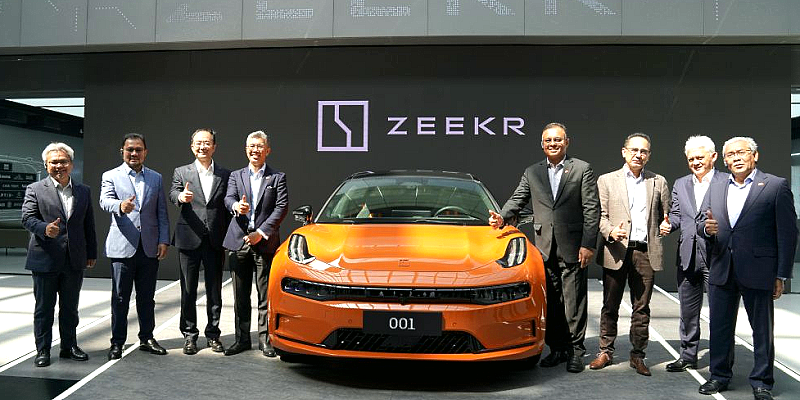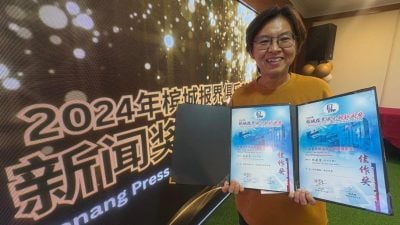
The world is entering an Age of Artificial Intelligence (AI).
Recently, China’s Alibaba Group unveiled its answer to ChatGPT, “Tongyi Qianwen” (or “truth from a thousand questions”).
Apps like these are now ubiquitous and present new challenges.
ChatGPT has led to concerns over plagiarism in education and the creative industry.
Let me assure you that this was written by yours truly and not a bot!
More seriously though, can technology such as AI help tackle a legacy economic issue for Malaysia, namely productivity?
Before we delve into that, let us face some hard truths.
Firstly, from 1971—2000, Malaysia led our Asean peers in terms of rate of labor productivity. But they overtook us from 2000 onwards.
Excluding mining, our annual average productivity growth was 4.9% from 1987 to 1997, but only 2.1% from 2007 to 2018.
Secondly, the issue of MSMEs’ lower productivity and share of exports compared to larger firms: Malaysian MSMEs contribute only 34% to manufacturing GDP, and only 48% to manufacturing employment, which represents a stagnation over the 2015-2021 period.
These realities effectively reduce business profitability and dampen Malaysia’s future attractiveness as an investment destination.
More serious is how they also stunt wage growth, especially since roughly 75% of Malaysian workers are in the MSME (including manufacturing) sector.
Although the Ministry of Investment, Trade and Industry (MITI) — which also monitors and promotes productivity through the Malaysia Productivity Corporation (MPC) – firmly believes that tech can be a key enabler for productivity growth in Malaysia, the bigger question is HOW?
On that score, I am chairing the task force on the New Industrial Master Plan 2030.
We are seriously looking to drive industrial transformation in manufacturing and related services to create a competitive industry with high complexity: build a high-income and skilled workforce; establish strong domestic linkages and initiate new industry clusters, while also ensuring our rakyat’s balanced and inclusive participation in a sustainable industrial development.
In achieving all those objectives, technology such as robotics, automation and AI must feature prominently in our carefully crafted policies.
There may be a few bitter pills to swallow, but this may be necessary to not only drive our industrial transformation, but also ensure the appropriate empowerment of our MSME sector and people so that they can compete and thrive in the new realities.
To balance out those bitter pills, the right industries must be supported to help Malaysia transition up the value chain, to produce more differentiated and higher value products.
There are many ways that tech solutions can help us achieve these.
First, “tech solutions such as collaborative robots” or “robotic process automation” can make jobs such as lifting heavy items or assembling microscopic parts easier and more cost-efficient.
AI systems can also quickly detect errors in production lines or assist in streamlining supply chain and inventory management.
They can also analyze data from manufacturing processes to support predictive maintenance for scheduled repairs.
In retail, data analytics from consumer buying patterns can support future product development.
All these mean improved time- and resource-efficiency, key components of productivity.
Second, technology-based industries can enhance our economic complexity and our industries’ value-adding capacity.
Simply put, economic complexity refers to the composition of a country’s productive output and reflects its structures that hold and combine knowledge, all of which define our export competitiveness.
Our economic complexity index grew from 1998 and peaked at 1.08 in 2013, but has declined since.
This process can be reversed by strengthening our research, development, commercialization and innovation (R&D&C&I) capacity.
A combination of higher productivity and higher economic complexity will also enable higher wages, promote sustainable wage growth and enhance our export competitiveness.
Third, automation in and of itself can strengthen our workforce.
A very controversial concept in the Age of AI is the so-called “lights-out factory,” i.e., factories that are run entirely by robots with minimal to no human interaction.
I saw a close approximation of one when I recently visited the Ningbo City, China factory of Zeekr, which is Geely’s premium EV brand.
Zeekr’s “Intelligent Factory” uses 5G+ and over 300 robots to fully automate key processes like welding.
The visit to the very sophisticated facility was eye-opening, to say the least.
There is naturally much debate surrounding “lights-out” manufacturing, including its impact on our workforce. But it cannot be reversed as the “Fourth Industrial Revolution” (IR4.0) marches on.
I believe that AI and similar technologies are not a threat and can be made to work for both our industries and labor, but there must be proper policies and appropriate regulations to prevent abuse.
On this note, internet ‘godfather’ Ron Conway is reportedly planning a meeting of leading influencers in the AI industry to discuss how to develop AI systems without serious unintended consequences.
Fourthly, on empowering our talent. IR4.0 gives countries like Malaysia the imperative to transform their talents.
Apart from needing more STEM graduates, Malaysia also needs to retrain workers to be more agile in case their skills become obsolete.
MITI is already partially realizing some of these goals through the Industry4WRD policy, where various programs have been introduced to support the adoption of IR4.0 technologies, including assessing industry’s readiness, as well as financing for automation and digitalization.
More recently, the re-tabled 2023 Budget also provides measures such as the RM100 million Digitization Grant Scheme for SMEs, and RM1 billion financing to help MSMEs automate business processes and digitize operations.
But the real overhaul will come with the NIMP 2030, and in achieving industrial transformation, Malaysian MSMEs must also be open to embracing new technology, while our workforce must be trained for continuous learning.
We must ensure our MSMEs and our talent pipeline can build their capacities in automation and digitalization, to meet future challenges such as competition from our neighbors and ESG demands in markets.
MITI hopes to launch the NIMP 2030 towards year-end, and our agencies stand ready to guide industries towards transforming their businesses, while also ensuring that new technologies are embraced safely, so that we can continue to increase investments and exports for Malaysia’s economic growth.

(Tengku Zafrul Tengku Abdul Aziz is the Minister of Investment, Trade and Industry, Malaysia.)
ADVERTISEMENT
ADVERTISEMENT







































